A few weeks ago Millennial Star contributor Tom S. wrote an essay titled, “The Meaning of the Gay Dating Fiasco at BYU”. This prompted some good discussion among our readers, some of which didn’t believe that there are people who work for and teach at BYU that don’t fully support the church. Tom’s essay was published right about the time a new group called Keeping Faith at BYU was organized. You might have read more about the group over on My Life by GoGoGoff. So far their work has prompted a lot of discussion in the affirmative and in the negative online. But it’s a discussion we need to have about BYU.
As our own J Max Wilson shared on twitter a few days ago, “I had chosen to major in English with my eyes wide open about what I was going to encounter. But I felt bad about the students who were not expecting or prepared for their faith to be attacked at BYU. I came to BYU knowing that there would be apostate professors and students. My father had been at BYU more than a decade beforehand working on his PhD and had often told us about his apostate professors. When my own daughter was accepted to BYU last year we had a good talk about the fact that she could not assume that either her professors or her fellow students would be faithful members of the church. She started BYU knowing that some of her professors and the other students might push apostate ideas and reject the teachings and directions of the prophets and apostles.”
Here are some submissions Keeping Faith at BYU has shared over the last few weeks on their Instagram page:
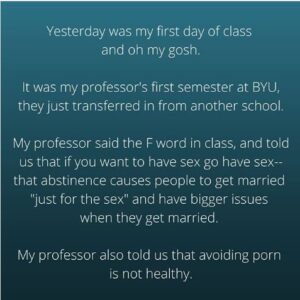
In the comments on the above post, someone asked why they didn’t “out” this professor’s name and that it must be fake otherwise. KFBYU responded that there was other identifying information that was submitted that verified who this was, and that they withheld the name so this person would have the chance to exercise their due process rights if necessary. But, no matter, BYU professors shouldn’t be swearing in class (or ever, none of us should be) and absolutely should not be encouraging students to break the commandments.
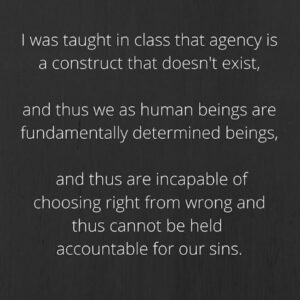

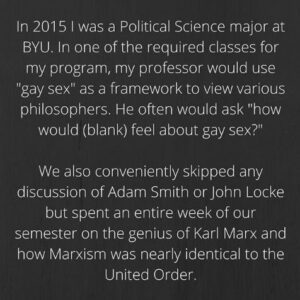
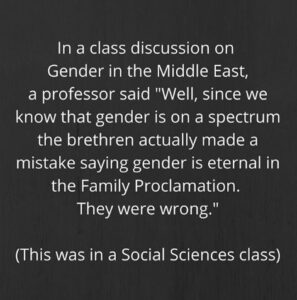
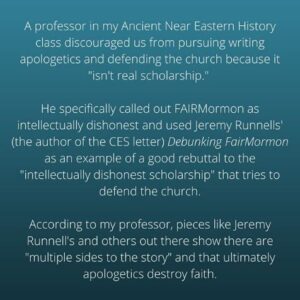

There are more examples on their Instagram page and in their twitter page. Some of these examples are very damning of what is happening in some of the departments at BYU. I get that we are all different and that people hold different views on various subjects, but it is not too much to ask that the faculty and staff that work at BYU, whose salaries are paid for by the tithing monies of the Church (the widow’s mite in many cases), be faithful and loyal to the Church of Jesus Christ of Latter-day Saints, will not subvert the teachings of the gospel of Jesus Christ, or turn the young minds and hearts of BYU students from these things.
We wish Tristan well in his efforts to bring some much needed light to some dusty corners at BYU. Please consider following their social media accounts and giving them your support.


More people need to Know how their tithing money is being spent at BYU and the truth about the anti-Lds indoctrination that is taking place there. This post needs to be sent far and wide.
The Gramscian March, BYU Edition.
I’m a convert and didn’t attend BYU — but I ignored my professors when they were talking about social matters.
There is a way to handle these matters. A student can talk to a dean, for example, or make a report to the honor code office. But spreading stories publicly and without names seems to me to be an unhealthy approach. It is very easy for a listener to mischaracterize what he or she thought was heard. Including names and dates in the stories would be honest and would allow for meaningful discussion — or example, someone else could say “I heard the same thing,” or “no, that isn’t what he said at all.”
Or, a student could simply agree to disagree, and life goes on.
I want BYU to be successful. I want its credentials to be respected in the wider academic and professional world. I don’t want to see a inquisition led by the authority or a retrenchment or witch hunt led by the mob. But I would be in favor of open and honest discussion, with complete facts and back-and-forth. I prefer meaningful dialogue over fear-mongering. And I want to be very cautious with the “apostate” label.
JI — Hannah and Tristan are working with BYU administration to allow professors and staff to have their due process, while also providing a place for students to share what they’ve heard and seen. As I said in the post, many of these submissions contain other identifying information that is not shared publicly so that the “cancel mob” doesn’t go after faculty and staff unfairly.
I attended a state school, without tithes subsidizing me. IF my tithes go to BYU, then the expected standards not only should, but must, be enforced. Why should my hard earned efforts go to subsidize someone’s sins and hubris?
And if the administration cannot or will not clean house, then it may be time to defund BYU from tithes.
Let it be totally pro Latter-day Saint, or let it compete with UofU and other secular schools outside of the financial protection of the Church. It can’t be two faced. It cannot worship God and Mammon. Church
Tithes are sacred. I’d rather they followed faithful young students to secular schools than to spend millions each year supporting a faux religious entity. It is akin to Liberty University keeping Falwell on after finding out about his sexual escapades. They didn’t keep him. We must not keep faux Latter-day Saint professors.
Joyce, Well, if the cancel mob is going after faculty and staff, as you suggest, I suppose it is better to do it fairly rather than unfairly. But I’d rather not have the mob going after faculty and staff at all — I wish individual students would quietly use established procedures and channels rather than public j’accuse approaches. I guess I am not convinced that BYU is the vipers nest it is portrayed to be, and I am somewhat troubled by the shrill voices that are so accusing.
Gerald, The Church and the University are different — they should support each other, certainly, but they are still different. My son is on his mission now, and is looking forward to attending and learning in a faithful LDS environment, which I still believe it is. We have a good enough relationship to talk about whatever his future professors might say, so I’m not concerned for the safety of his soul at BYU. I am grateful for the Church and for the University, for different reasons, and for the wonderful gift by the Church that is the University.
I just don’t think things are as bad as they are made out to be. But that’s me, and I live a long way from the center place. I realize my sentiments are contrary to this thread’s purpose, so I won’t speak further.
Ji — that’s the problem. Students don’t feel like they do have access to those channels. The Honor Code Office is not a reliable place for faithful students.
I am as disgusted at the apostasies being promulgated by some BYU profs as anyone. But I think we need to be careful of the “*I* get a say, because it’s *MY* tithing dollars that support it” mentality. That’s a common ProgMo whine about Church actions or inactions, but it’s beneath those of us who take the Church’s claims about its own truth and authority at face value.
The simple fact is, it’s *the Lord’s* tithe money; administered by His duly appointed stewards in the Council on the Disposition of Tithes. I didn’t pay my tithing so that BYU can churn out orthodox (or even merely “not-batshizzle-crazy”) graduates. I paid my tithing so that I could learn selflessness and sacrifice and to be a better person; and that has *nothing* to do with whether or how the money I donated is actually used. The Lord (or my bishop) could flush it all down the nearest toilet, for all I care.
Certainly there’s a means by which we can direct the Church leadership’s attention to issues, practices, or events of which we sincerely believe they may not be aware. And knowing what we know about BYU in its current form; we should probably use wisdom in determining whether we will encourage our children (or the children of our loved ones) to attend, and whether we will use our own non-tithing resources to further BYU’s program and projects, and so on. But if we drift into asserting some kind of moral “ownership” interest in BYU or trying leverage public pressure on the Church leadership to Do Something™—
—Methinks that seems a little too “Ordain Women-ey” for my liking.
People teaching against Church doctrine at BYU is a significantly bigger problem than many people recognize. The issue is that students attend BYU expecting all things that go on there to be Church sanctioned. So if they have a teacher speaking out against the Church or opposing Church doctrine they begin to think that this is Church sanctioned. Imagine if YM and YW went to Sunday School and heard teachers speaking out against the Church. Would that have a negative effect on testimonies or not? It would be devastating for the people in that ward. It is quite another thing for students to go to a school not affiliated with the Church and hear things going against Church teachings. This is to be expected, and students know how to deal with such things. But to have such teachings at a Church school is simply not acceptable. As I have said in other comments, I would prefer that BYU be half or one-third or its current size — with no sports programs — than be a school of the world. I think most active LDS parents agree with me.
JimD, I think you make a good point — it is the Lord’s tithing money, not mine. That is a good correction.
As a reminder, the staff of the Millennial Star reserve the right to moderate and delete comments which do not follow our comments policy. Also, if you want to call people names, those comments will also be deleted. https://www.millennialstar.org/comments-policy/
I encourage everyone to read the actual mission statement of BYU and then ask if having apostate teachings in the classroom goes along with that mission.
You can read the entire mission statement at https://catalog.byu.edu/about-byu/mission-of-byu but here are some excerpts:
“The mission of Brigham Young University—founded, supported, and guided by The Church of Jesus Christ of Latter-day Saints—is to assist individuals in their quest for perfection and eternal life.”
“To succeed in this mission the university must provide an environment enlightened by living prophets and sustained by those moral virtues which characterize the life and teachings of the Son of God.”
“All students at BYU should be taught the truths of the gospel of Jesus Christ. Any education is inadequate which does not emphasize that His is the only name given under heaven whereby mankind can be saved.”
Geoff B is correct that apostate teachings are a bigger problem than most people realize. If BYU chooses to allow/promote these teachings, that’s fine but let’s update the mission statement at least be honest with the students, parents, and the Church what to expect at the Lord’s university.
Our Lord has said, “If ye are not one, ye are not mine”. We can have differing opinions on some things as we progress through our second estate in our individual circumstances, but on certain points of doctrine there can be no divergence. Unity is strength. Thank you for posting the testimonies above–testimonies in the legal sense, proof of what is happening at BYU.
2020 seems to be a watershed year in American society, but choosing the Lord’s side has been the paradigm in every dispensation.
Mosiah 29:26 states, “Now it is not common that the voice of the people desireth anything contrary to that which is right; but it is common for the lesser part of the people to desire that which is not right; therefore this shall ye observe and make it your law—to do your business by the voice of the people.”
These are uncommon times in the generational scope of things but not uncommon in the history of mankind. People listen to the Sherems, Korihors, Zeezroms, and Gadiantons of our time. Read between the lines:
“For none of these iniquities (abortions, sexual immorality well defined by the Church, rioting, looting, murder, uprisings against decent law enforcement, advocating for atheistic materialistic ideologies (Marxism-Leninism), the abolition of the nuclear family) come of the Lord; for he doeth that which is good among the children of men; and he doeth nothing save it be plain unto the children of men; and he inviteth them all to come unto him and partake of his goodness; and he denieth none that come unto him, black and white, bond and free, male and female; and he remembereth the heathen; and all are alike unto God, both Jew and Gentile.” (2 Nephi 26:33)
BYU represents the Church of Jesus Christ of Latter-Day Saints to the world (the world is our campus). It does not matter whether you, your parents, or your children attended BYU or not. Yes, tithing funds are the Lord’s. But the Sacred Grove, Nauvoo, the Pioneer Trek, the Salt Lake Temple and Temple Square, BYU Provo and a few other institutions belong to all members, to our collective faith and history. We also have other sacred places unique to our histories.
Whosoever interprets “the world is our campus” as “our campus is like the rest the world” goes against the mission of BYU, as James said.
Clean it up, the Salt Lake Tribune and apostates of all stripes will be outraged for a few weeks and BYU will be all the better for it after it passes. Draw the line for students and staff and aspiring students and staff. Thank you Geoff and Joyce again for the meaningful conversation.
I am dismayed, but not surprised at the stories told in those Instagram posts based on what I know about the “academic professor class.” I have observed this throughout my undergrad and graduate education. I think it is necessary for college and university students, particularly at church school, to keep in mind.
The academic class is overwhelmingly liberal, leftist and Marxist in there thinking. As such they have little diversity of thought amongst themselves. Believe me when I tell you that academics are very concerned about what other academics think of them. Thus there is not a lot of dissent of the liberal dogma of the day. They are petrified about being shunned by the larger academic community, so most toe the line. Academics in general sneer at religion. These BYU professors spoken of by these students are frankly embarrassed by the church. They are hoping they can keep their status in the academic community by being subversive against the church with their students.
Academics tend to know a lot about a very little. Very often what they do know a lot about is esoteric and has little practical value outside of academia. Many professors would not have the skills to work at anything aside from menial entry level jobs in the real world. These professors have spent a lot of time money and effort to get their doctorates. It bothers them that the wider world doesn’t appreciate their brilliance. The truth is, aside from being an adjutant professor full time teaching jobs at universities are scarce and competitive. I’m really only surprised that these BYU professors are so openly subversive when they know their job may be in on the line. I guess they can’t help themselves. Perhaps this has gone on for so long that they know nothing will happen to them.
One more thing, those in the academic class is inclined to look down on anyone that doesn’t have a minimum of a Master’s degree as “uneducated.” They can be very snobbish. They look down at the parents of their students that aren’t a part of their club. They see it as their job to correct parents’ “miseducation.”
Obviously not all professors are like this. BYU has some exemplary men and women both academically and spiritually teaching there. Every parent and student should understand that these wonderful professors have had to and continue to swim upstream against the trends of the academy. It is likely that students will encounter several faithless professors at BYU-Provo and likely BYUI.
In the end, BYU professors should be looked on with the same skepticism as you would view professors at any other secular university. It is sad but true.
I am a faculty member and administrator at BYU. I have taught here for more than two decades. Given the serious nature of these accusations, I am troubled by the cavalier way in which anonymous complaints are being given wide circulation by people who seem inclined to accept them without the slightest degree of skepticism. Believe it or not, there are institutional procedures in place to deal with student concerns about faculty members and it does not consist in circulating petitions or spreading idle gossip on websites and across social media. The faculty members with whom I am acquainted are, to a person, committed to the gospel and are responsible and thoughtful educators. Do I agree with every political and social view that every one of my colleagues may espouse? No. And I am grateful for that. Is there a great deal of intellectual and political diversity among the faculty? Yes, perhaps much more diversity than one would find on most US college campuses these days. And I am grateful for that as well. Do I have any reason to believe that my colleagues are not as committed to the gospel as I am? Absolutely not. At a time when “cancel culture” has become fashionable in many quarters, I am disappointed to see it so breezily endorsed here without any attempt to understand how diligently faculty members work to ensure that our students are given a world-class education while equipping them with tools to fortify their faith. That is not to say that a faculty member may not stray outside well-established boundaries on occasion. But we have mechanisms for addressing those concerns and they don’t involve viral campaigns or the wielding of rhetorical pitchforks on supposedly faithful LDS blogs. It is disheartening to see how quickly uninformed, or partially informed, observers in the blogosphere may assume the worst of the university, its faculty, and its administration (including, just to be clear, its Board of Trustees). And to those who say that these complaints are coming from first-hand reports of students themselves, I would nevertheless urge caution, pointing out that that there have long been BYU students who seem extraordinarily keen to take offense at the slightest provocation. While legitimate, substantiated grievances need to be heard and addressed, Elder Bednar long ago offered some counsel on that count that those students would do well to heed.
I’ll reiterate what I said before. While they may not generate clicks, or satiate our hunger on social media for controversy, or reinforce our own political views or sense of self-righteousness, we have well-established procedures in place at the university to deal with challenging cases when they arise. The readiness of anonymous mobs on the web to seize upon the slightest whiff of controversy and to so readily mischaracterize the difficult work that my colleagues and I do is to fundamentally misunderstand the nature of this university and the consecrated sacrifices made by faculty, staff, and students. That is not to say that the university does not have room to improve or that individual faculty members may not have said or done something regrettable on occasion. In rare cases, discipline may be needed. But to irresponsibly give air to alleged grievances like this does a disservice to all of us.
Anon BYU Prof, methinks thou dost protest too much. Notice that no individual professors are named in this post. This is on purpose. We don’t believe in cancel culture, so this is why individual professors are NOT named. The purpose of this post is to raise awareness among the general LDS community that not all is well at BYU, according to many students and many professors who have contacted us privately. Many LDS parents send their kids to BYU expecting that classes will be like YM or YW or Institute. This is clearly NOT the case. And many, many people end up disappointed with what happens to their kids when they go to BYU. Just off the top of my head, I could name 20 or so parents whose kids have lost their testimonies after going to BYU Provo. Interestingly, this does not appear to happen at BYU Idaho or BYU Hawaii. It has gotten so bad that one bishop in Colorado, who graduated from BYU, encourages parents not to finance their kids going to BYU Provo for this very reason.
Of course everybody should be cautious about anonymous things they read on the internet (including comments from anonymous BYU professors. Ahem.). This is basic common sense. There are many reasons for people to still go to BYU, which has many great academic and athletic programs. I think everybody reading this knows that. Anonymous Prof, what you are not internalizing is that many parents and YM and YW simply do not know that if they go to BYU they are going to get challenges to their testimonies. This is new information for most Latter-day Saints. That is why this OP is appropriate.
Geoff B, your response demonstrates the problem with the way your blog is addressing the controversy (such as it is): you begin with a subtle dig at my own experience (and perhaps personal convictions?) and then proceed to share some anecdotes consisting of, well, what? Some vague impressions about the education we provide in Provo (as opposed to Rexburg and Laie) and a story about a bishop in Colorado. If there are students who lose their testimonies here, or anywhere, that is unfortunate indeed. But certainly you are aware that stray anecdotes, in the absence of further context and data, give us almost nothing to work with. I can tell you that my colleagues and I take such matters seriously indeed. But no one is well served by passing along unsubstantiated accusations on social media, some of which seem patently absurd on their face. But it’s grist for the mill, I suppose: perhaps it feeds some of your readers’ appetite for gossip and scandal while providing them with the satisfaction that they are somehow helping the Brethren to keep the doctrine pure, since their appointees in the university administration are incapable of doing so. Don’t believe me? Look at the character of the responses the post has solicited. Handwringing about Gramsci and Marx (!), grousing about the disposition of sacred tithes, etc. The post seems to have generated less of a good-faith attempt to discuss what’s going on on campus than to allow readers to tee-off on their own pet issues about higher education.
My post simply offered an invitation for your readers to recognize that, while reports of scandals and heresy garner clicks, stoke outrage, and perhaps provide momentary satisfaction of some sort, the university is well administered and has implemented reasonable procedures for registering genuine concerns. Of course I guess that to blandly assert, based on my own experience as a faculty member, that a dose of caution is warranted before your readers scramble to sharpen their pitchforks, can’t really complete with the salacious gossip that the post passes along. I offered you a point of reference for your blog’s readers to bear in mind and if you or they take no interest in it, that is no business of mine.
Well said, Geoff. Alerting fellow Saints about problems is not necessarily “self-righteousness”. None of us are perfect and the General Authorities acknowledge this during Conference, including themselves in the “still learning” category. Whether in Sunday School, Seminary, or at BYU, statements like those reported by the students need to be reported through the proper channels. If the Honor Code Office is not doing its job, change staff and students. If it sounds like the Inquisition or a purge, I am sorry. Nobody is going to torture anyone to death over this so words should be used carefully, but of course some people will use them and get emotional instead of rational. I am a high school teacher and I know that students can and will record things, with or without permission. The screenshot about Extra-Credit for attending a protest is an example of activism that can be discussed by staff and students in a meeting or online. There is photographic proof. If a professor denies saying exactly what the student reports having heard, then it must be corroborated by other students and the professor should either repent or face consequences for their actions. I support KFBYU.
Anon BYU Prof,
You and others keep talking about “institutional procedures in place to deal with student concerns about faculty members”
What are these procedures? How often are they used? When was the last time a professor was sanctioned (not sure if that’s the right word) over apostate teachings?
My guess is that it’s rare that any professor at BYU has been disciplined for apostate teachings because you know the media would be all over that in a heartbeat.
Maybe now you can see why me and others on this blog might be skeptical that these internal procedures are in any way effective considering the stories that are coming out of BYU including the Honor Code debacle earlier this year.
And before you ask me to be skeptical about anonymous claims, my uncle was a tenured professor at BYU for over two decades. I regularly heard him and other professors profess skepticism at the words of prophets and apostles, the honor code, etc. This was in the 90s and 00s. I can only imagine things have gotten worse since then.
I graduated from BYU in 2019. My faith was challenged. Not by professors though, but by fellow students. I will never forget the night I was with a group of sophomores at Liberty Square. Two of which has just returned from their missions. We were talking about school and I mentioned that I was studying economics. Immediately one of the boys asked why and I answered that I was thinking of going to law school or foreign service and I thought it would be a good major to get me started on that path. He answered “I would never date a girl like you because you aren’t interested in fulfilling your divine role as a mother.” I was shocked. The other boy agreed with him and when I tried to argue they quoted the family proclamation and said I should talk to my bishop. I remember calling my dad the next day crying on the phone asking if it was sinful of me to want both a family and a career.
I remember when I worked as a secretary in the business school and one of the female professors told me how several students had copied and pasted the family proclamation in the anonymous student reviews and told her that she should be at home with her kids.
I remember asking another female professor I had if it was difficult teaching at BYU. She said that she loved it, but she also noted a time when a male student told her she wasn’t being a good mother by having a job.
I remember a poster in the economics department that had economic thinkers through time and what category they fell under. They had Joseph Smith on the poster next to Utopian Socialism (referencing both the law of consecration and the popular economic theories during Joseph Smith’s life in the US). A university administrator saw the power and demanded that it be taken down because Joseph Smith can’t be associated with socialism.
I remember my geology professor mentioning how he was reported to the honor code office by a student for teaching that the earth was not created in a week and is older than 6 million years.
I remember these and so many other situations where my own religious beliefs seemed to contradict those of the people around me. There are more times than I can count where somebody said that it’s impossible to be a democrat and a good Mormon (probably forgetting about James E. Faust).
The point is that your faith is always going to be challenged no matter what. We all believe core doctrine but there are so many different interpretations. My extended family though all good and faithful temple-recommend-holding members, differ widely in their beliefs and disagree often.
BYU is a place to learn and because of this it is also a place where students should expect to be challenged. They should expect to sit in a classroom with diverse perspectives and think for themselves.
Church leaders voice opinions over the pulpit all the time. Professors should be allowed to do the same. We are all human. Students need to learn how to handle and work with people who disagree with their beliefs or they will never survive in the real world much less the workplace.
BYU Grad … I just want to say, I’m sorry that people were jerks to you. I often felt the major I picked (Int’l Relations/economics) was also why I didn’t have a lot of dates, or male friends at BYU. I will tell you this though, Brigham Young would tell you to get your education and skills and whatever else you needed to live your life and build the kingdom of God. From a personal standpoint, I was always taught to get as much education as I could. My grandmother was a widow with 5 children at the age of 42. Because she had a degree she was able to step right into her husband’s teaching job and taught school for another 35 years. My own mother taught school for 20 years and put three kids on missions with her school teacher salary. I didn’t get married until I was 30 years old. I had to take care of myself for many years — with my education! Now, I’m a mom with three kids remote/home schooling, using my education and degree teaching my children. You never know when your education and college degree will come in handy.
It feels a little ironic to be told that BYU administrators don’t need public criticism of faculty to keep them in line, when BYU administrators are in the middle of a campaign of public criticism against a student they have labelled “racist” (not just tactless or thoughtless or rude) for voicing the same question Morgan Freeman voiced on 60 Minutes: “Why don’t we have a White History Month?”
I agree with much of what both Geoff B and Anon BYU Prof said, and, as a BYU student, I think BYUGrad hit very close to what I suspect is the real problem: the culture shifts at BYU Provo, mostly among the students themselves.
I suspect that poor behavior/bad examples from other students contribute significantly more to students leaving the Church than professors do. It might just be a combination of having rich, smart, inexperienced people finding new found freedoms among roomies who are just a little more converted to Netflix/Disney than the Gospel.
Social media amplification just adds fuel to the fire.
This BYU-Hawaii address from 1988 (32 years ago) may be of interest–
https://speeches.byuh.edu/david-o-mckay-lecture/the-idea-of-a-mormon-university
When I was a child, my mother actively created a culture for us, complete with a rich wealth of stories. Amidst the fights and star-crossed lovers, there were themes of corruption and those in the halls of religious power corrupting things for their own benefit (or perceived benefit).
When I grew older, I realized that many of the themes of this culture my mother had created and the stories we loved to hear were minor adaptations of themes found in the Book of Mormon. That is, she was not plagiarizing, but internalizing.
At least BYU isn’t in the pickle Liberty University currently finds itself in.
If we have read the Book of Mormon, we should be prepared for all manner of ways that God’s children can stray from God’s truth.
Even at what many would consider the closest thing to God’s university.
Also, I would remind folks that the God we worship is a champion of freedom. BYU as an educational institution suffers in that sphere if it is perceived that professors and students have a greater duty to orthodoxy than to truth. So I would expect it to be unlikely that professors would be excused from the right to be professors for seemingly minor disagreements with orthodoxy.
Joyce writes: “You might have read more about the group over on My Life by GoGoGoff.” I read (past tense) that blogpost since I can’t put my two cents in on Twitter, Instagram, and Facebook (I don’t have accounts). My Life by GoGoGof says, “You can sign the petition to have BYU retrench (return the roots of the gospel). The petition to retrench at BYU is on change.org”. I searched change.org and could only see mostly liberal petitions associated with the word BYU (154 petitions with BYU according to my search). Maybe I didn’t look far down enough but needless to say, some things on change.org aren’t my cup of conservative Latter-DaySaint herbal tea. I respect the rights of citizens in this free country to free speech, to post petitions that I would sign, look into, or disagree with. Just saying, I could not find the petition to retrench BYU, wondering if it has been removed.
I agree it is the Lord’s tithing, not mine. That said, we need to ensure that the Lord’s tithe is going towards moving His Work forward. The Church used to use the Lord’s tithes to send all our young men through the Scouting program. Once Scouting began to sway from its own Honor Code and began to use our tithes as a slush fund and cash cow, it was time to cut bait and develop a new program. I was a Scout leader in the Church for many years, but totally agreed with us leaving Scouting.
The same holds true with BYU. It is a separate entity, in part. Yet, it receives large funds via tithing. It’s Honor Code is for both students and staff. Its purpose is to provide a faithful and safe place for young Saints to gain an education, learn the gospel, and perhaps find an eternal mate. If a young student breaks the Honor Code, they risk being expelled. If a staff member breaks the Honor Code, he/she should also be called onto the carpet.
Yes, it is the Lord’s tithes, but it came from MY hard work. I want to ensure that God’s sacred funds are used for sacred purposes. If BYU wants to be separate from the Church, fine. But then they must decide whether they want to use those sacred funds or not by choosing to follow and support the gospel. If they are going to be like any other school, why should sacred tithes continue to only go to this school? Suddenly, it is no different from any other secular university, if they are no longer going to embrace and defend the gospel of the Jesus Christ. It becomes a waste of sacred funds, and like the new Scout Movement, it profanes those sacred funds.